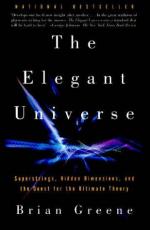
|
| Name: _________________________ | Period: ___________________ |
This quiz consists of 5 multiple choice and 5 short answer questions through Chapter 3, Of Warps and Ripples.
Multiple Choice Questions
1. General relativity is incompatible with _____.
(a) State theory.
(b) Quantum mechanics.
(c) The photoelectric effect.
(d) The big bang theory.
2. What is the shape of all particles, at the smallest possible level, according to string theory?
(a) A thread of thin strings.
(b) A one-dimension loop.
(c) An infinitely long string.
(d) A tangled ball of thin filament.
3. What is different about a particle of antimatter, compared to its normal counterpart?
(a) Negative mass.
(b) Complementary spin.
(c) Zero mass.
(d) Opposite electrical charge.
4. Edwin Hubble used Einstein's theories to show that the fabric of the universe _____.
(a) Has a finite boundary.
(b) Is not static, it must either be shrinking or expanding.
(c) Is not flat, it is curved, either inwards or outwards.
(d) Is uniform in all places and times.
5. What is the result when a particle of matter and a particle of antimatter are brought into contact?
(a) A strange quark is formed.
(b) Energy is released and both particles are destroyed.
(c) A black hole is formed.
(d) A theoretically unlimited amount of energy is released.
Short Answer Questions
1. Einstein's equation, E=mc^2, states that which of the following are equivalent?
2. What type of motion cannot be felt or sensed by the moving observer?
3. According to general relativity, all objects that have mass have what effect on space-time?
4. How can black holes be detected?
5. In 1968 it was discovered that protons and neutrons are composed of which type of particle?
|
This section contains 307 words (approx. 2 pages at 300 words per page) |

|




